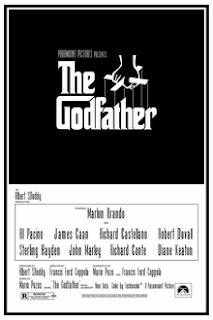With its golden-brown hues, Coppola's The Godfather (1972) is an autumnal movie. It describes the fall season in the life of Don Vito Corleone (Marlon Brando), a "benevolent" Mafia boss, for those who believe that such a contradiction can exist. In Chinese philosophy, autumn is the season of iron and steel, the matter from which the bullets and knives with which the gangsters kill, are made. Corleone is shot down by a rival gang, ironically because he refuses to assist them in the drugs business, which he detests. That allows the real hero of the film to step to the fore: Corleone's youngest son Michael (Al Pacino), who was meant for a career in society outside the "family," but who now returns to avenge his father.

In a pivotal scene, where we see his bright and youthful eyes turn cold and cruel, he assassinates the rival gang boss and his henchman, a corrupt police officer. Then he hides for a while in Sicily, on native ground so to speak, before returning to take over the gang. He grows as a strategist, but also becomes as cold as steel. The apex of his nihilism is reached when he shows off his ruthlessness by killing the bosses of five rival families, who were ganging up on him, while himself attending a church service. "Do to others all the evil they want to do to you, but do it faster," he must think with a criminal variant on a Christian maxim. The assassination scenes are intercut with the baptism ritual in the church. Michael professes his faith, while outside he is dealing in death.
The three hour film is based on a pulp novel, but raises the material to epic heights, although soap elements are not lacking either. The problem is, that it has no complexity, no ambiguity, and as "just an entertainment" ends up glorifying the gangsters and the anti-society culture of "the family." For a realistic treatment of the mafia as a social problem, read the crime novels by Italian authors as Sciascia or Camillieri, who show how admiration for gangsters (or silence about their misdeeds) can pull a whole society down into gangsterism and nepotism. It is therefore unbelievable to me that The Godfather is often called the “best film ever made” - it is stupid pulp, only good to waste a few hours - the best thing of the film is the music by Italian classical film composer Nino Rota which in fact is much too beautiful for this sordid tale.
The three hour film is based on a pulp novel, but raises the material to epic heights, although soap elements are not lacking either. The problem is, that it has no complexity, no ambiguity, and as "just an entertainment" ends up glorifying the gangsters and the anti-society culture of "the family." For a realistic treatment of the mafia as a social problem, read the crime novels by Italian authors as Sciascia or Camillieri, who show how admiration for gangsters (or silence about their misdeeds) can pull a whole society down into gangsterism and nepotism. It is therefore unbelievable to me that The Godfather is often called the “best film ever made” - it is stupid pulp, only good to waste a few hours - the best thing of the film is the music by Italian classical film composer Nino Rota which in fact is much too beautiful for this sordid tale.